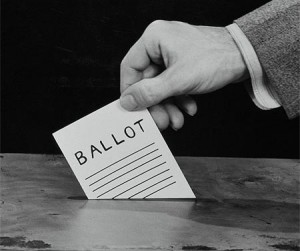
Since recently becoming a citizen, how I follow politics has changed. Not being able to vote allows you to examine the political debate in a detached way. You can argue both sides, make abstractions, and never have to worry about making a choice. It’s nice, actually. From the sidelines, you can see more clearly the mad and infuriating genius of the American political system.
But as a citizen, the fantasy evaporates. When we elect someone, we choose them over another. We decide that one candidate is more deserving of an elected position than their opponent. Making the choice can be difficult, particularly at a time when combative rhetoric and absurd amounts of money smother most real conversation about issues and principles. There is much to be concerned with in how we elect our leaders, but our votes are important nonetheless.
That’s my thesis, at least, but not everyone agrees. NPR ran an article this week about the “Other Abstinence Movement” — non-voters. Many of the reasons given by non-voters for their abstinence draw on religious or cultural motivations for not voting, such as a Native American not voting as an assertion of their tribal sovereignty, for example. These I can understand, but they apply to only a small proportion of the ~ 45% of American’s who don’t vote. Let’s take a look at some of the other reasons given in the article, which I hear all the time.
“I do not vote because I believe that at the end of the day, money is more powerful than a ballot.”
Without question, money has become an enormously powerful force in politics. According to the NYTimes, the Obama campaign has raised $934m while the Romney campaign has raised $882m. That’s almost $2b dollars spent on the presidential election alone. The Center for Responsive Politics estimates another $4b will go towards other elections, bring the total to nearly $6b. For some perspective, that’s enough to build about 1000 elementary schools; for more perspective, that’s only enough to pay off less than 1% of next years projected budget deficit.
But that doesn’t mean you shouldn’t vote. In fact, it implores you to vote. Money may influence politicians, pay for TV adds, or lobby for special interests, but as long as people vote, as long as citizens do their best to choose the candidate they think will be the best president (or congressman, or city council member), we might still have our say. Only when we stop voting has money won.
“A simple understanding of statistics shows that my vote does not matter.”
It’s easy to suggest that a vote doesn’t matter. There are 300 million people in this country, so at that level, yes, one vote is unlikely to make a difference. And that’s not to mention the electoral college, which does more to disenfranchise American voters than any voter suppression measures.
But that doesn’t mean you shouldn’t vote. If the 2000 election teaches us anything, it’s that elections can come down to individual votes. Moreover, the broken electoral college system is thrown into sharp relief in close elections, especially when the popular vote and the electoral college don’t align. In those cases, your Republican vote in California or your Democratic vote in Texas do matter, because they expose our system’s flaws.
Your vote matters, for your country and, most importantly, for you. It takes the concern of ordinary citizens to make change. High speeches and promises by politicians won’t do it, we have to get involved. Voting is the first, most basic, and most important measure of involvement. So go vote tomorrow, even if you live in California. Go now and vote.
